How much do you know about the history of our university? Based on a popular Twitter thread from 2020, this blog post uses records from our very own archives to tell the story of our foundation and early development. If you prefer to access this content via video you can do that using the following […]

